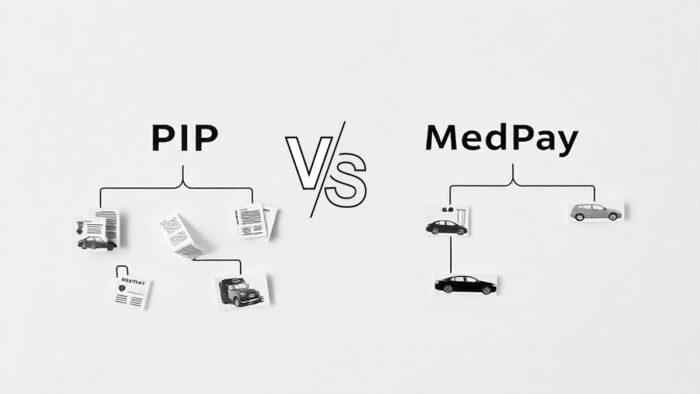Most drivers often confuse PIP for MedPay, thinking they are the same but they are different. While searching around the car insurance policies can be difficult, differentiating between PIP and MedPay can be very confusing to differentiate.

Personal injury protection (PIP) and medical payment coverage (MedPay) both cover the medical bills of drivers, irrespective of who is at fault for the accident. These coverages are similar to each other because they both pay medical bills regardless of which driver is at fault for the accident. MedPay covers medical bills for bodily injuries you and your passengers sustain after an accident. While PIP also pays medical bills and covers other documented losses like lost wages.
What is PIP?
Personal injury protection, abbreviated as PIP, is a type of no-fault insurance that covers the medical cost, lost wages, and other car accident-related costs irrespective of who is at fault. In some states, this insurance is mandatory for every driver to have.
It covers financial expenses for bodily injuries sustained in the event of an accident. It also covers lost income, household costs, burial costs, medical bills, child care, and survivors’ loss.
Benefits of PIP
One of the benefits of PIP is that it has a comprehensive nature. It provides coverage for several expenses, which include nonmedical costs and rehabilitation costs. It protects policyholders from a wide range of financial difficulties after an accident. However, it covers other necessary expenses like childcare while the policyholder recovers from injuries.
What is MedPay?
Medical payments coverage, abbreviated as MedPay, is an optional addition to car insurance policies. It covers medical expenses as a result of accidents, regardless of who is at fault. It is similar to personal injury protection, but there are key differences between them that you must know.
MedPay covers sensible and necessary medical costs of an insured person involved in a car accident, regardless of who is at fault. MedPay is beneficial to those in need of additional coverage for medical expenses after an accident.
Benefits of MedPay
Flexibility is one of the major benefits of MedPay. Based on your insurance policy and state laws, MedPay insurance works as primary medical insurance after the occurrence of an accident.
It covers medical bills before your health insurance coverage kicks off. MedPay serves as a supplement to health insurance coverage, offering additional coverage for medical costs that may not be covered by the existing health insurance policy.
PIP vs. MedPay: What’s the Difference?
PIP and MedPay are types of insurance coverage that cover the medical expenses of drivers after an accident, but PIP is more comprehensive than MedPay and covers more than just medical bills. When differentiating them, it is important to look into their benefits, limitations, your state’s requirements, and personal needs. The table below illustrates the differences between PIP vs. MedPay:
| Personal Injury Protection (PIP) | Medical Payments (MedPay) |
| It covers policyholders, their family members, passengers, and any driver permitted to drive the vehicle. It pays suitable accident-related medical and burial costs within three years of the accident. | It covers suitable accident-related medical and burial costs. Depending on your policy, what and who it covers varies. For this reason, it is important to check your policy. |
| Insurance companies are mandated to provide $2,500 for each person stated in the coverage. | Insurance companies are not mandated to offer this coverage. |
| 80% of lost wages is paid by PIP if the injured person is unemployed. It also pays for essential services like lawn and child care. | MedPay does not pay lost wages, nor does it pay for essential services if the injured person is unemployed, unlike PIP. |
Depending on your state’s requirements, which of the following you need will be determined. This is because, in some states, it is legally required for drivers to have PIP or MedPay Insurance.
Is Personal Injury Protection (PIP) Better Than Health Insurance?
PIP insurance coverage offers more benefits than health insurance. It requires no out-of-pocket payments and no network restrictions, unlike health insurance. For this reason and more, personal injury protection is a much better option than health insurance.
Can MedPay Stand as Primary Medical Insurance?
Indeed, MedPay can serve as primary medical insurance. This, however, depends on your policy type and whether or not it is acceptable by your state. For this reason, it is important to check with your state and insurer if this coverage can stand as primary medical insurance.



